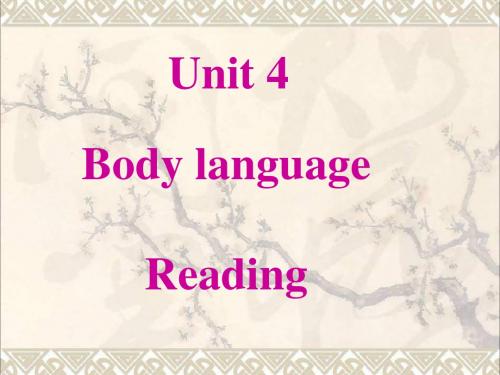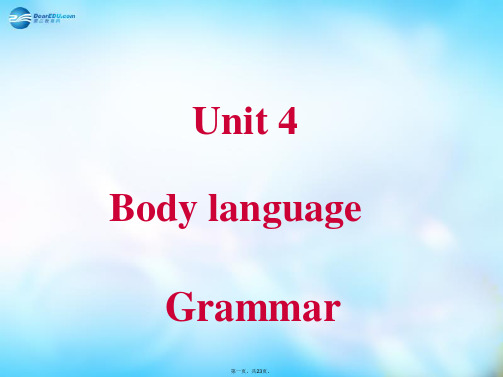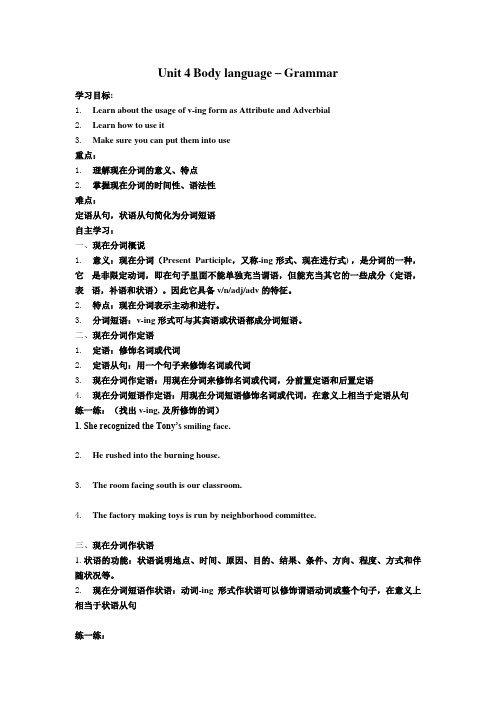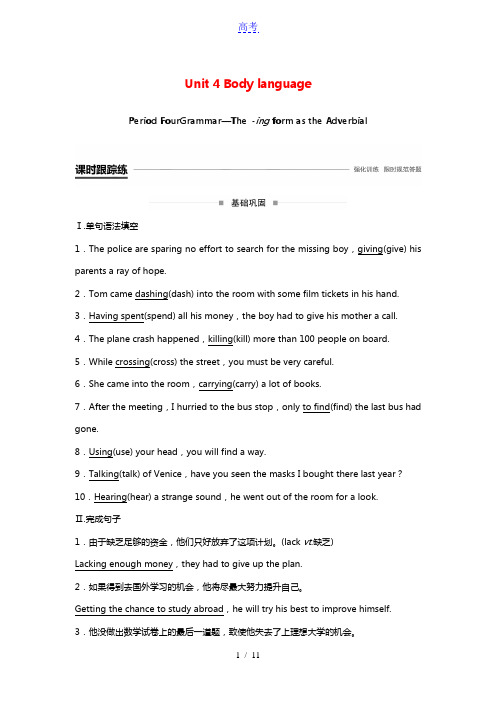高中英语Unit4BodylanguageSectionⅣGrammar
高中英语 Unit4 Body language Grammarreading课件 新人教版必修4

the airport:
He approaches Ms Smith
The first
Mr.
Garcia from (Columbia
)
byt_o_u_c_h_in__g __h_e_r__ _s_h_o_u_ld__er__ and k__is_s_e_d__ her on the _c_h_e_e_k___.
C) You are sent to Pudong Airport to meet business people. D) Examples of learned or cultural “body language”.
Detailed Reading
Read the text again , then decide if the following statements are true (T) or false (F).
China, Britain Russia, France, Arab Japan, Korea Some western countries
hug
Shake hands
Kiss Bow hug
Reading
Communication: No problem?
Fast Reading
The passage can be divided into four parts, and match the main idea of each part.
Read the text carefully, then decide if the following statements are true (T) or false (F).
Englishmen often stand close to others or touch
高中英语 Unit 4 Body language Grammargrammer课件 新人教版必修4

A. to take
moving the hand in circles over the stomach
after a meal.
表语
表语
(biǎoyǔ)
• 5. If we are f(ebeiǎliong down or lonely, there is
ngootohdinfgribenetdte.yrǔ)than to see the smiling face of a
3).–ing 形式作主语(zhǔyǔ)表示一般或 抽象的多次性的动作;不定式作主语 (zhǔyǔ)往往表示具体的或一次性的动 作。
Getting up early is a good habit.
To finish the work in a week is impossible.
第五页,共23页。
• Part 3 on page 62.
Practice
• 1.She stopped going …
• Part 2 on page 62. • 1 amazing
• 2.I feel like taking a rest. Would you mind my sitting down…?
• 2 disappointing
(2) 某些 v–ing 形式作主语(zhǔyǔ)时,可使用It 形式主
It is no use/good v-ing.
It is no use quarrelling with her.
It is no good telling lies / being a liar.
说谎是没有好处的。
第四页,共23页。
C. 既可用动名词也可用不定式作宾语的动词,且 意思(yì sī)区别较大的有:
高中英语人教版必修四Unit 4 Body language Grammar教学设计

Unit4Body language–Grammar学习目标:1. Learn about the usage of v-ing form as Attribute and Adverbial2. Learn how to use it3. Make sure you can put them into use重点:1. 理解现在分词的意义、特点2. 掌握现在分词的时间性、语法性难点:定语从句,状语从句简化为分词短语自主学习:一、现在分词概说1. 意义:现在分词(Present Participle,又称-ing形式、现在进行式) ,是分词的一种,它是非限定动词,即在句子里面不能单独充当谓语,但能充当其它的一些成分(定语,表语,补语和状语)。
因此它具备v/n/adj/adv的特征。
2. 特点:现在分词表示主动和进行。
3. 分词短语:v-ing 形式可与其宾语或状语都成分词短语。
二、现在分词作定语1. 定语:修饰名词或代词2. 定语从句:用一个句子来修饰名词或代词3. 现在分词作定语:用现在分词来修饰名词或代词,分前置定语和后置定语4. 现在分词短语作定语:用现在分词短语修饰名词或代词,在意义上相当于定语从句练一练:(找出v-ing, 及所修饰的词)1. She recognized the Tony’s smiling face.2. He rushed into the burning house.3. The room facing south is our classroom.4. The factory making toys is run by neighborhood committee.三、现在分词作状语1. 状语的功能:状语说明地点、时间、原因、目的、结果、条件、方向、程度、方式和伴随状况等。
2. 现在分词短语作状语:动词-ing形式作状语可以修饰谓语动词或整个句子,在意义上相当于状语从句练一练:【例句呈现】观察下列句子中动词–ing 形式作状语的用法,然后加以总结。
人教版高中英语必修四 Unit4 Body language-语法篇(学生版)

Unit4 Body language语法篇____________________________________________________________________________________________________________________________________________________________________要求学生掌握本单元的重点语法----动词的-ing形式作定语和状语并能熟练运用相关语法知识解决相应类型的题。
一、动词的-ing形式由“动词原形+ing形式”构成,它既是现在分词形式,也是动名词形式。
v-ing能在句中作主语、宾语、表语、定语、宾语补足语和状语,但不能单独作谓语。
其时态和语态的变化为二、动词-ing形式的作用1.动词-ing形式作定语E.g. The sleeping baby looks very beautiful. (前置定语)这位正在睡觉的婴儿看起来太漂亮了。
E.g. The man sitting in the car is waiting for his daughter.(后置定语)坐在车里的男子正在等他的女儿。
E.g. The law being carried out is to ban drunken driving.(后置定语,强调正在被执行的法律)正在执行中的这则法律旨在禁止酒后驾驶。
名师点拨(1)现在分词短语作定语时通常后置,而单个的分词作定语时可置于被修饰词的前面,也可置于被修饰词的后面。
(2)现在分词的完成时的主动及被动形式均不作后置定语。
2.动词-ing形式作状语。
(1)作时间状语。
E.g. Working in the office, the clerk heard an explosion from the street.在办公室工作时,这位职员听到街上发出了爆炸声。
E.g. Having finished her homework, the girl was busy with the thing she likes.完成了家庭作业,女孩就忙于做她喜欢做的事情。
高中英语Unit4BodylanguagePeriodFourGrammar_ThePresentP

Unit 4 Body languagePeriod FourGrammar—The ing form as the AdverbialⅠ.单句语法填空1.The police are sparing no effort to search for the missing boy,giving(give) his parents a ray of hope.2.Tom came dashing(dash) into the room with some film tickets in his hand. 3.Having spent(spend) all his money,the boy had to give his mother a call. 4.The plane crash happened,killing(kill) more than 100 people on board. 5.While crossing(cross) the street,you must be very careful.6.She came into the room,carrying(carry) a lot of books.7.After the meeting,I hurried to the bus stop,only to find(find) the last bus had gone.8.Using(use) your head,you will find a way.9.Talking(talk) of Venice,have you seen the masks I bought there last year?10.Hearing(hear) a strange sound,he went out of the room for a look.Ⅱ.完成句子1.由于缺乏足够的资金,他们只好放弃了这项计划。
人教英语必修4课件:Unit4BodyLanguageSection4

Unit 4Section IV Guided Writing观点的描述与表达类作文■【写作技巧】■描述针对某个现象的正反双方的不同看法是一种经常岀现的作文类型,题目本身的条理性非常有利于进行层次清晰的表达。
此类作 ;文通常包括四个部分。
■第一段:描述题目中提出的现象。
描述要简明扼要,切中要点,不要过多增加细节。
■第二段:针对这一现象,支持者的观点。
观点要在第一句明确表达出来,随后给出理由秦或者举出例证。
■第三段:反对者的观点,与上一段类似,先■【常用句型】■(1)描述现象常用句型:;■; U■With the development of.. .,As everybody knows •…■(2)表达观点常用句型:;;;;■in one,s point of view …/ one,s view of point …■in one, s opinion... / one thinks….■one prefers …./ one agrees that/with…./ one emphasizes …■as far as I can see... / as far as T m■【写作范例】■随着信息技术的快速发展,网络语言以其快捷的传播方式进入了人们的生活。
根据某机构反对者有些网络语言粗鲁,庸俗;汉语言是传统文化的基础,过多地使用网络语言会使下一代逐¥ 传统文化。
你的观点(不少于两点)■请给21世纪英语报写一篇题为Is cyber language dangerous?的报道,陈述攻上的调查结果并发表你自己的看法。
■注意:1.不要逐条翻译,可适当发挥;:■2.词数100左右;开头已写好,不计入总词数。
;;;;■参考词汇:草根文化grass - roots culture;庸俗vulgar■ Is cyber language dangerous?■With the development of information technolosv,cvber lansuase has steDDed into our■【参考范文】■ Is cyber language dangerous?■ With the development of infoTmation technology,cyber language has stepped into our life and is spreading rapidly.AccoTding to a survey Tecently conducted among high school studentsJhere are various views about the use of■ The supporters think cyber language is a product of the information age,which can be regarded as a new form of grass - roots culture.They also think cyber language words are easy to learn or understand,so they are convenient touse.Besides,cyber language can not only enrich■However,many students reject the use of cyber language.Firstly,cyber language words are rude and vulgar.Secondly,the Chinese language is the foundation of our great culture.Overusing cyber language will cause young people to gradually forget our traditional culture.■In my opinion,it is dangerous to use too much cyber language,for it may well do great harm to our mother tongue.As the foundation of the traditional culture,the Chinese language is the standard language.We teenagers should learn it well and at the same time go all out to handV I I。
高中英语:Unit 4 Body Language Grammar(新人教必修4)

高一英语同步练习:必修4 Unit 4 Body Language第3课时Grammar基础练习Pay attention to the following sentences1.reading room 阅览室swimming pool 游泳池dining car 餐车2.Who is the comrade standing by the door?3.They lived in a house facing south.4.Yesterday, another student and I, representing our university’s student association, went to the Capital International Airport to meet this year’s international students.5.Seeing those pictures, she remembered her childhood了解V_ing做__定语__的用法了解V_ing作__状语__的用法实战演练一、v-ing做定语的用法V-ing.做定语①单个的分词作定语一般放在被修饰词的前面。
如:reading room 阅览室swimming pool游泳池dining car 餐车the exciting news令人振奋的消息a boring speech令人乏味的演出②V-ing.分词短语作定语应放在被修饰词的后面,也相当于一个定语从句。
如:Who is the comrade standing by the door? 站在门边的同志是谁?They lived in a house facing south. 他们住在一所朝南的房子里。
二、V-ing分词做状语:V-ing分词作状语可以表示时间、原因、结果、条件、让步、方式或伴随情况等。
①V-ing分词短语作时间状语,相当于一个时间状语从句,有时可由连词when, while引出。
高中英语Unit4BodylanguageSectionⅣGrammar

高中英语Unit4BodylanguageSectionⅣGrammarⅠ.完成句子1.工作了三个小时后她休息了一会儿。
________________for three hours,she took a rest.2.由于不知道他的住址,我立即给他打了电话。
________________his address,I telephoned him at once.3.看到那些照片,她想起了她的童年。
________________,she remembered her childhood.4.因为没有做好充分的准备,我们把运动会延期了。
________________,we put off the sports meeting.5.他坐在椅子上看报。
He sat in the chair ________________.【答案】 1.Having worked 2.Not knowing3.Seeing those pictures 4.Not having made full preparations 5.reading a newspaperⅡ.阅读理解A【导学号:34410037】Facial expressions carry meaning that is determined by situations and relationships.For example,in American culture (文化) the smile is in general an expression of pleasure.Yet it also has other uses.A woman's smile at a police officer does not carry the same meaning as the smile she gives to a young child.A smile may show love or politeness.It can also hide true feelings.It often causes confusion (困惑) across cultures.For example,many people in Russia consider smiling at strangers in public to be unusual and even improper.Yet many Americans smile freely at strangers in public places (although this is less common in big cities).Some Russians believe that Americans smile in the wrong places; some Americans believe that Russians don't smile enough.In Southeast Asian cultures, a smile is frequently used to cover painful feelings.Vietnamese people may tell a sad story but end the story with a smile.Our faces show emotions (情感),but we should not attempt to “read” peoplefrom another culture as we would “read” someone from our own culture.The fact that members of one culture do not express their emotions as openly as members of another do does not mean that they do not experience emotions.Rather,there are cultural differences in the amount of facial expressiveness permitted.For example,in public and in formal situations many Japanese do not show their emotions as freely as Americans do.When with friends,Japanese and Americans seem to show their emotions similarly.It is difficult to generalize about Americans and facial expressiveness because of personal and cultural differences in the United States.People from certain cultural backgrounds in the United States seem to be more facially expressive than others.The key is to try not to judge people whose ways of showing emotion are different.If we judge according to our own cultural habits,we may make the mistake of “reading” the other person incorrectly.【语篇解读】本文为一篇说明文。
- 1、下载文档前请自行甄别文档内容的完整性,平台不提供额外的编辑、内容补充、找答案等附加服务。
- 2、"仅部分预览"的文档,不可在线预览部分如存在完整性等问题,可反馈申请退款(可完整预览的文档不适用该条件!)。
- 3、如文档侵犯您的权益,请联系客服反馈,我们会尽快为您处理(人工客服工作时间:9:00-18:30)。
Unit 4 Body language Section Ⅳ Grammar & WritingⅠ.完成句子1.工作了三个小时后她休息了一会儿。
________________for three hours,she took a rest.2.由于不知道他的住址,我立即给他打了电话。
________________his address,I telephoned him at once.3.看到那些照片,她想起了她的童年。
________________,she remembered her childhood.4.因为没有做好充分的准备,我们把运动会延期了。
________________,we put off the sports meeting.5.他坐在椅子上看报。
He sat in the chair ________________.【答案】 1.Having worked 2.Not knowing3.Seeing those pictures 4.Not having made full preparations 5.reading a newspaperⅡ.阅读理解A【导学号:34410037】Facial expressions carry meaning that is determined by situations and relationships.For example,in American culture (文化) the smile is in general an expression of pleasure.Yet it also has other uses.A woman's smile at a police officer does not carry the same meaning as the smile she gives to a young child.A smile may show love or politeness.It can also hide true feelings.It often causes confusion (困惑) across cultures.For example,many people in Russia consider smiling at strangers in public to be unusual and even improper.Yet many Americans smile freely at strangers in public places (although this is less common in big cities).Some Russians believe that Americans smile in the wrong places; some Americans believe that Russians don't smile enough.In Southeast Asian cultures, a smile is frequently used to cover painful feelings.Vietnamese people may tell a sad story but end the story with a smile.Our faces show emotions (情感),but we should not attempt to “read” peoplefrom another c ulture as we would “read” someone from our own culture.The fact that members of one culture do not express their emotions as openly as members of another do does not mean that they do not experience emotions.Rather,there are cultural differences in the amount of facial expressiveness permitted.For example,in public and in formal situations many Japanese do not show their emotions as freely as Americans do.When with friends,Japanese and Americans seem to show their emotions similarly.It is difficult to generalize about Americans and facial expressiveness because of personal and cultural differences in the United States.People from certain cultural backgrounds in the United States seem to be more facially expressive than others.The key is to try not to judge people whose ways of showing emotion are different.If we judge according to our own cultural habits,we may make the mistake of “reading” the other person incorrectly.【语篇解读】本文为一篇说明文。
我们应该如何正确“解读”来自不同文化背景下的面部表情呢?1.What does the smile usually mean in the US?A.Love B.Politeness.C.Joy. D.Thankfulness.【解析】细节理解题。
根据第一段第二句“...in American culture(文化)the smile is in general an expression of pleasure.”可知在美国文化中微笑是高兴的体现,故答案为C项。
joy意为“高兴”。
【答案】 C2.The author mentions the smile of the Vietnamese to prove that a smile can ________.A.show friendliness to strangersB.be used to hide true feelingsC.be used in the wrong placesD.show personal habits【解析】细节理解题。
根据文章第一段最后两句“In Southeast Asian cultures,a smile is frequently used to cover painful feelings.Vietnamese people...”可知在东南亚的文化中,微笑常常用来掩盖痛苦的情感,故答案应为B项“被用来掩盖真实的情感”。
【答案】 B3.What should we do before attempting to “read” people?A.Learn about their relations with others.B.Understand their cultural backgrounds.C.Find out about their past experiences.D.Figure out what they will do next.【解析】推理判断题。
根据第二段第一句话“...but we should not attempt to ‘read’...someone from our own culture.”可知我们不能用“解读”自己(国家)文化中成员的方法去“解读”其他(国家)文化中的成员,因此在“解读”人们之前首先应了解他们的文化背景。
故答案为B。
【答案】 B4.What would be the best title for the text?A.Cultural DifferencesB.Smiles and RelationshipsC.Facial ExpressivenessD.Habits and Emotions【解析】主旨大意题。
根据文章第一句话可知本文主要论述facial expressions (面部表情)。
因此C项为最佳标题。
【答案】 CBOne of the simplest and the most effective forms of communication involves nothing more than the movement of facial muscles.What am I talking about?Smiling! Everyone understands what a smile means, and everyone also understands what a frown means.In fact, these two basic facial expressions can be recognized across countries, across the world and across the globe, regardless of the language spoken or the culture lived in.Hugs are so beautiful! When you give someone a hug or someone comes up and gives you a hug, this simple act of a hug can “speak” volumes about how much you care for the other person, how much love you want to share with the other person, how much you have missed the other person.This hug has so much to say, and yet there never has to be any words spoken.And, who needs to say the words “yes” or “no” when a movement of the head says the same thing.These basic examples show just how powerful body language can be.Just knowing how to read and use body language effectively, makes it really easy to see why it is not always a bad thing to be lost for words.Body language in the world of love is a very common thing and sometimes the onlything.And,most of the time, body language is the very first words “spoken” before any words are.The old saying is “love at first sight”,not “love at first word”.Across a crowded room, their eyes meet and linger,he winks at her, and she raises an eyebrow.The connection is made without any words needed.These displays of body language say it all. In fact,sometimes they can say more than words can.【语篇解读】身体语言在我们的日常生活中扮演着重要的角色,比如微笑、拥抱以及恋人间的深情凝视等。
